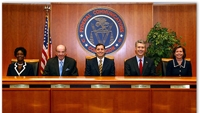House asks for FCC retransmission consent review by year’s end
The professional video industry's #1 source for news, trends and product and tech information. Sign up below.
You are now subscribed
Your newsletter sign-up was successful

Two members of the House, Reps. John Dingell, D-MI, and Jo Ann Emerson, R-MO, have asked the FCC to complete its retransmission consent review by the end of the year. That would be in time before the next round of contract expirations that would require retransmission negotiations.
Dingell said a “reasonable action” by the FCC would “provide greater certainty in the video marketplace and ultimately benefit the American consumer.” Emerson said she had heard from some of Missouri’s smaller pay-TV providers about the possibility of increased signal losses due to impasses and consumer disaffection and dislocation.
“With more than a thousand carriage deals set to expire by the end of this year,” Emerson said, “it is essential that the commission have new rules in place to help avoid the types of carriage disruptions for consumers that we’ve seen increasingly occur.”
Members of Congress do not want to live through another prolonged retransmission battle with major sporting broadcasts being blocked from viewers. Neither does the FCC. Last week, the commission accepted public comments from interested parties on the issue. The usual suspects restated their positions.
Cablevision, representing the cable side of the issue, laid out three fixes it wants from the FCC involving retransmission consent reform. The fixes include preventing the tying of TV station carriage with co-owned cable nets. The practice, it said, has raised consumer prices by bundling must-have programming with “limited interest” offerings.
Cablevision also wants to require broadcasters to publicize their price for TV station carriage and to prevent “discrimination” in price based on the size of an operator or satellite provider.
It also wants the commission to eliminate the syndicated exclusivity and network nonduplication rules, and to not impose more viewer notification requirements, which it says would “encourage broadcaster brinkmanship, confuse consumers, cause MVPDs to be more vulnerable to unreasonable retransmission consent demands, and result in higher rates for MVPD subscribers.”
The professional video industry's #1 source for news, trends and product and tech information. Sign up below.
Cablevision is a member of the American Television Alliance, whose petition prompted the FCC to propose reviewing the retransmission rules.
The NAB wants nothing changed. It warned the FCC against micromanaging retransmission consent negotiations and said that “substantial and numerous changes,” which have been sought by cable and satellite operators, are unwarranted.
NAB supports expanding notification of potential signal drops to noncable MVPDs and making sure that early termination fees do not hinder consumers that might want to switch their TV service should a dispute affect their access to programming. Aside from that, the NAB said retransmission isn’t broken and doesn’t need fixing.
Public Knowledge, a digital rights public interest group, told the FCC it has more power to remake retrans negotiations than it is willing to admit and urged the commissioners to use it.
Those changes include better clarifying what qualifies as good faith negotiations and perhaps even terminating rules that currently prevent cable operators from negotiating carriage with similarly situated stations or programming from outside of the market at issue. Public Knowledge said the FCC has “ample authority” to use those measures to break retransmission “deadlocks.”
Public Knowledge joined with cable and satellite operators and others to form the American Television Alliance and petition the FCC for rule changes. But the group said the commission has to actually bite rather than just bark.
“For these rules to be effective,” Public Knowledge said in a joint filing with the New America Foundation, “the commission has to enforce them.
“The commission has thus far shirked away from any meaningful enforcement of its existing rules. In the one instance in which the FCC found rule violations, the commission merely required the parties to resume negotiations within 10 days and report on the status of the negotiation every 30 days. Such timid enforcement sends a message to powerful parties to these negotiations that they can ignore the good faith requirements with impunity.”
